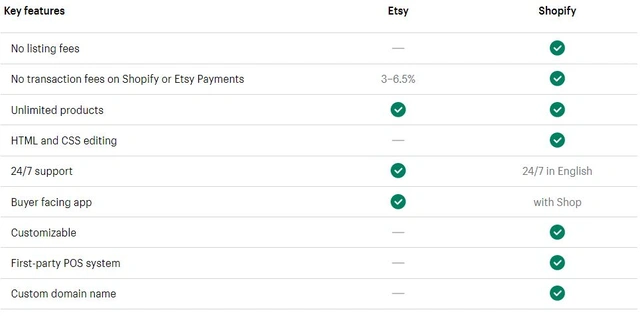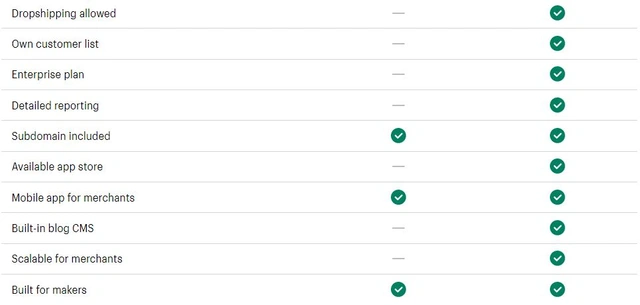Get access to exclusive updates, the latest news and the inside scoop 🍨

Etsy vs Shopify For Handmade Product Sales 🧶
Who would come out on top in the battle between Etsy vs Shopify?
Don't want to read the whole article? 😏Click here for chapters

Written by Madeleine
Etsy vs Shopify - Which is Best? 🥊
Whether you’re looking to sell handmade products, vintage apparel or personalised items, Shopify and Etsy are the two of the most sought-after ecommerce platforms on the web that merchants turn to when it comes to kick-starting their online business.
Both platforms offer great features for ecommerce stores to get their store off the ground, but there can only be one winner in comparison. So, the real question is - who would come out on top in the battle between Etsy vs Shopify?
This is the question that we will aim to answer within today’s guide, as we delve deeper into the details of whether Etsy or Shopify is better for the online brands that sell handmade goods in 2022.
Etsy vs Shopify 2022 - Key Features 🗝️
Before we get started on whether Etsy or Shopify is the better platform for ecommerce businesses with a handmade product inventory, we'd suggest taking a quick look at their key features below:


10 Areas Where Shopify Has the Edge Over Esty
N0.1: Take Charge of Marketing Methods
Through Shopify’s ecommerce platform, merchants will be able to take full charge of their brand’s marketing methods as users will have full ownership over their; audience, website and email list.
However, the same cannot be said for merchants on Etsy. So, when it comes to taking charge of your store’s marketing methods, we believe that there’s one clear winner in the battle between Etsy vs Shopify for more reasons than one.
In addition to Shopify’s flexible control and customisation over a variety of marketing methods and techniques, the platform also provides its merchants with the option to retarget their customers through the likes of email marketing or abandoned cart ads.
Etsy on the other hand does not permit merchants to remarket to previous buyers after a sale has been made, but merchants can expect to take advantage of the platform’s free traffic flow.
With that being said, we here at Karmoon believe that the ability to own your marketing is one of the most important aspects of running a successful online business, which far outweighs Etsy’s offering of free traffic.
Of course, generating traffic for your online store is essential, but Etsy provides a quick solution with a roof over potential growth and expansion, whereas Shopify removes that limitation, with the capability to take your business to the next level through the implementation of solid marketing strategies.
As a dedicated Shopify agency, we understand how much Shopify values its customers and it is clear to see that the platform also recognises the importance of marketing ownership for businesses that want to be successful on their ecommerce journey.
In a nutshell, if you’re looking for the best platform to launch and manage your store, we’d urge you to see the bigger picture beyond Etsy’s beginner-friendly marketplace.
Why? Well, Etsy might appear to be a tempting option at first, but when you start comparing it to Shopify, it quickly becomes apparent that Shopify is by far the stronger contender in the Etsy vs Shopify comparison, as the platform provides its users with ongoing development, support and cutting-edge features so they can always keep ahead of the competition.
N0.2: Enjoy Zero Listing Fees
Wondering whether Etsy or Shopify is the best platform for your business? Well, thanks to Shopify’s generosity, we have some information that might help you to make your decision with a sweetened deal.
On Shopify, merchants can upload an unlimited number of products for a monthly price plan, whereas Etsy charges a $0.20 USD listing fee for every product that is uploaded to a store.
Additionally, Etsy doesn’t just charge a one-time fee for its product listings, as listing fees will need to be renewed once every four months if a product remains unsold within the timeframe.
In hindsight, if you were to list over 1,000 products on Etsy in 12 months, a total of $800 USD could be required for listing fees alone.
Therefore, if you have a large product inventory or are planning to expand your inventory volume within the near future, Shopify may turn out to be a more affordable option between the two platforms.
N0.3: Own your Assets with Shopify
If you choose to run an ecommerce business on Shopify, you’ll also be able to own your assets!
That’s right, a Shopify website is an asset in and of itself that belongs to the merchant who created the store, but unfortunately, the same cannot be said for merchants on Etsy, as each store is just one component of the vast marketplace ecosystem.
Furthermore, any unsold (but paid for) product listings are not seen as assets either, but rather as a liability and an ineffective form of expenditure for many merchants on the platform.
However, owning your assets goes beyond the claim of a website domain and its contents, as asset ownership is also super important for merchants to be able to have full control over their business and its future potential.
See, merchants on Shopify have full say over what happens in their store and for their store and to support this, the platform has enabled its users to draw customers to their store and increase organic traffic and revenue for their business by implementing customisable and flexible marketing methods.
Merchants can also add a blog as well as other marketing assets throughout their website to increase online sales and this is all possible thanks to the full asset ownership that Shopify provides its customers with.
On the other hand, the future of a business can go beyond just marketing methods and should you decide to sell your Shopify store and move on to bigger and better business ventures, you can do so by taking total control of your business and its path through the Exchange Marketplace.
Etsy, however, does not allow the transfer of any Etsy store to another party as stated within the platform’s Terms of Use and as we mentioned above, Etsy offers little to no marketing capabilities, flexibility or control to its customers.
Therefore, we don’t believe that ownership is something that businesses should ever associate with the platform.
However, all of these boxes can be ticked with ease through Shopify’s ecommerce solution, as merchants can run each business like an independent contractor, with full freedom and ownership of each asset.
So, when contrasting Etsy vs Shopify it’s pretty easy to see how the two companies compare, but ultimately the decision is yours and the future you’d like to choose for your online store.
N0.4: Unlimited Potential for Growth
The next section in our Etsy vs Shopify comparison discusses which platform offers its customers the most potential in terms of evolution and expansion at scale.
To us, it seems only fair to uncover which platform offers unlimited potential for merchants by askingwhich solution hosts the most billion-dollar businesses.
Now, this may not come as a surprise, but Shopify enables millions of merchants, marketers, creators and entrepreneurs to launch and expand their business on its platform, and many of these businesses have surpassed their business valuation to over $1 billion dollars.
Some of the most popular businesses on the platform include; SKKN by Kim, Kylie Cosmetics and Gymshark.
Of course, these are just a handful of the heavy hitters, but you can take it from us that it’s not just leading enterprise brands that are raking in the sales on Shopify.
Don’t believe us? Take a look at our work page to discover some of Karmoon’s favourite projects to date. We help businesses to kickstart and streamline their success with Shopify.
Etsy on the other hand is more of a marketplace than an ecommerce platform which focuses on generating free website traffic for small startup businesses and from this, it seems likely that we can conclude that Shopify is the platform with the most billion-dollar businesses to its name and it is also the company that offers merchants the most potential to expand with unlimited growth.
N0.5: Shopify Stores are Made to Scale
As an ecommerce platform, Shopify is built for small, medium and large-sized businesses, but the reason that this solution comes out on top in the battle between Etsy vs Shopify in this section is that Shopify stores are also made to scale.
What does this mean? Well, on Shopify, small businesses don’t have to stay small for long if that’s not in their interests for the future. However, certain brands are designed to be small and that’s okay too.
For some businesses, the goal will be to reach the enterprise level, for other stores on the platform, it would be more in line with the business plan to keep things small-scale and these businesses can be just as successful as some of the larger stores on the web.
So, how do Etsy and Shopify differ when it comes to a brand reaching its full potential?
Well, we’d say that the biggest difference between the two solutions is largely because Shopify focuses on the opportunities for expansion and growth of an online store, whereas Etsy tends to lean towards the promotion of products rather than the business itself.
So, if you’ve been wondering whether Etsy or Shopify would be the best platform for your business to scale and reach its fullest potential, we’d always recommend Shopify, as this solution enables merchants to promote and build a successful brand in the way that they’d like.
N0.6: Unlimited Products Across all Price Plans
With unlimited product listings made available to those who sign up for any Shopify price plan, merchants can enjoy the benefits of experimenting with different trending products to see which items convert to the most sales for their store.
However, with Etsy’s listing fees taken into consideration, this could severely limit the number of products that can be added to an online store depending on the available budget.
Additionally, it’s important to remember that not all products will sell well so, this could mean an unfortunate loss of expenditure on Etsy through items that remain unsold.
Thankfully though, merchants will not need to worry about losing money on Shopify thanks to the platform’s generosity of zero listing fees!
N0.7: Customisation and Control
When it comes to customisation and control of an online store, we have to give credit where credit is due in the comparison between Etsy vs Shopify.
See, with Shopify, merchants can design their store in any way that they want, with the utilisation of countless theme designs, not to mention the customisation of HTML and CSS editing, to alter a website and improve its conversions.
On Etsy however, merchants will need to adhere to the marketplace layout with minimal ability to alter its appearance and functionality beyond pictures or copy.
So, if customisation and control are essential for you and your online store, we’d have to say - go with Shopify!
N0.8: Beat the Competition with Shopify
When comparing Etsy vs Shopify, it’s clear that competition exists, however, we believe that the competition is less visible on Shopify, as the platform enables online stores to find nooks and crannies where they can promote their business away from the crowd.
Needless to say, this is like a golden opportunity for most merchants, where brands can market their business on any social platform or ad platform, with email lists and so much more without the involvement of direct competitors around your listing.
Etsy on the other hand is swarmed by competition and over-stuffed results, where one product will blend with hundreds of competitor products in search, making it harder to compete and stand out from the crowd within this marketplace.
N0.9: Say Goodbye to Competitive Prices
Merchants can say goodbye to competitive prices when they join the Shopify crowd, as merchants on the platform can set prices reflective of their products, their quality and their brand’s reputation.
However, a marketplace like Etsy demands competitive pricing, causing sellers to lower their prices to stay ahead of the competition.
Unfortunately, though, competitive pricing often results in lost opportunities. Sure, the intention means well and who knows, you may even land that sale against your competitors, but in the long run, how much profit is your business going to lose in the process?
This is all food for thought but if you’re ready to run a business that isn’t restricted by competitive pricing, we’d say that Shopify is the better option for you and your business.
N0.10: Generate More Sales with Shopify
When considering Etsy or Shopify, you might have also wondered which platform generates more sales for merchants in general.
Well, we have some news so can we have a drumroll, please?
According to what we’ve heard, Etsy sellers generated over $10 billion USD in sales in 2020, whereas Shopify merchants accumulated a whopping $119 billion USD in sales that very same year.
It is thought that this figure increased by 96% in comparison to 2019, but even when you compare Etsy to Shopify in terms of GMV, Shopify merchants outperform Etsy sellers by a long shot.
So, if you’re still with us in this Etsy vs Shopify comparison, we’d recommend going with Shopify’s ecommerce platform to generate more sales for your online business.
Why Do Merchants Prefer Shopify over Etsy?
Fewer Product Restrictions
When it comes to the comparison of Etsy vs Shopify, there’s no denying that Shopify has fewer product restrictions than its competitor.
On Etsy, merchants must personally make all listed products by hand, be vintage, or a craft supply according to the website and from what we’ve read, these are the only items that are entitled to be on the platform.
Of course, there are several items that Shopify has prohibited for sale on its platform too, but this is to be expected and is not quite the same as ruling out all products that do not fall under one of these three categories.
Therefore, as Etsy is a niche platform, centred around handmade products and crafting items, we’d have to say that it would be easier to sell on Shopify with fewer product restrictions limiting your store’s inventory.
If you’d like to take a look at the list of items that are prohibited for sale on Shopify, please refer to the platform's Acceptable Use Policy.
Flexible Store Design
In this next section, we’re discussing whether Etsy or Shopify provides merchants with the most flexibility when it comes to building, designing and customising their online store.
Well with Shopify, merchants can design a website in any way that they’d like by simply choosing from; dozens of themes, customising the code and branding their website in a way that fits their business best.
Etsy however is less adaptable when it comes to customisation and it's no wonder as the platform is more of a marketplace.
For merchants, this means that there are limitations when it comes to changing the structure of your product collections and pages.
Therefore, if you’re looking to establish an online presence with a bespoke ecommerce store, we’d go with Shopify to put branding and individuality at the forefront of your business.
Etsy or Shopify Domain Ownership?
In the battle between Etsy vs Shopify, one question that often comes up is which platform enables merchants to take ownership of their domain.
As an ecommerce platform, Shopify naturally enables its users to set up a unique domain name for their online store and this domain name is an asset since it will help merchants to develop a brand and drive more visitors to increase their domain authority.
However, Etsy on the other hand is not in the position to offer its users a unique domain asset, but the platform does offer its users the ability to set up their subdomain.
Nonetheless, Shopify bats right back against Etsy in this area too, as the platform also offers subdomains to its customers. In light of this, we’d say that Shopify is the winner in this section too.
Countless Shopify Integrations
In the Etsy vs Shopify contest, we’re afraid that there’s no discussion about which platform is most supportive of its users and the potential growth and expansion of each business.
As a marketplace, we feel that Etsy could do a great deal more to support its customers with a variety of tools, resources and integrations just like Shopify, as the solution provides users with more than 6,000 apps through the Shopify App Store to run an online store with greater efficiency.
First-Party POS
Did you know that merchants can sell their goods in person using Shopify's first-party POS system?
Shopify POS is a service which is available through Etsy's Square integration, however, it is provided by a third party.
24/7 Shopify Support
When it comes to the battle of who provides the best support for its customers, there’s no contest between Etsy vs Shopify, as Shopify offers excellent support to its merchants via; phone, email and/ or chat 24/7.
Additionally, Shopify also supplies online stores with the likes of; help docs, social media support, webinars, blogs and more to help merchants feel ready to succeed with their business, but Etsy support is somewhat limited in comparison.
Own an Asset
As we mentioned earlier in today’s guide, online stores will own their assets when they come aboard the Shopify train.
Naturally, this is great news for merchants on Shopify, as this means that retailers will be able to take ownership of their; domain name, brand, products, social media accounts and email list(s).
However, Etsy only enables its users to take ownership of their product inventory which is only for a limited time until product fees need to be renewed once again.
So you have to ask yourself, who is benefiting here? Is it the merchant? We think not.
Zero Transaction Fees
When comparing Etsy vs Shopify, there’s no denying that Shopify has lower transaction fees than its competitor.
On Etsy, transaction fees are 6.5% on the sale price or 3-4% when using Etsy Payments, whereas Shopify only charges 0.5-2%. However, transaction fees are not charged when merchants use Shopify Payments.
Etsy or Shopify? - FAQs
Got a few questions? Check out the section below to view some of the most frequently asked questions when comparing Etsy to Shopify:
N0.1: What’s the Difference Between Etsy vs Shopify?
When comparing the difference between Etsy vs Shopify it’s important to understand that Shopify empowers merchants to build and own a unique website whereas Etsy is more of an online marketplace with limited capabilities and growth potential.
This means that Shopify enables merchants to build their brand, take ownership of their marketing and create an asset that grows from small to medium to a household brand.
N0.2: Can Merchants Migrate Etsy Products to Shopify?
Yes! Etsy data can be migrated to Shopify with ease. Simply head over to the Etsy dashboard and click Settings > Options > Download Data.
Note: It’s also worth noting that Shopify also has a Store Importer tool that allows merchants to export; products, customers, orders and order items from Etsy to Shopify.
N0.3: Can Merchants Sell Products on Etsy from Shopify?
Yes! Shopify merchants can sell products on Etsy through Shopify using a third-party app such as Etsy Marketplace Integration by CedCommerce from the Shopify App Store!
With this app, merchants can upload their Shopify products to Etsy with ease.
N0.4: Is Etsy or Shopify More Cost Effective?
When comparing Etsy vs Shopify in terms of cost-effectiveness, it has to be said that cost efficiency will ultimately depend on how many products you sell.
While Shopify asks its merchants to sign up for a monthly price plan when joining the platform, there are no product listing fees or hidden fees entangled with these subscriptions.
Additionally, merchants are also able to sell an unlimited number of products in their store, whereas Etsy charges quarterly listing fees which can accumulate rather quickly as an unwanted expenditure if your brand has a sizable product collection.
N0.5: Etsy vs Shopify - Which One Is Better?
Still curious whether Etsy or Shopify is the better option for your business?
Well, if you’re a small-sized business that sells handmade products, craft supplies, or vintage items, Etsy has a pre-built audience on their marketplace making them a good and reliable choice for your business.
However, Shopify would be the best option if you’re intending to sell goods in popular niches such as; fashion, home decor, automobiles, kitchens, or any other because there are fewer product restrictions to follow, not to mention fewer limitations on asset ownership and customisation.
Additionally, Shopify offers a wealth of support and capabilities for your business from the Shopify App Store and Shopify Theme Store.
N0.6: Do Etsy or Shopify Sellers Make More Money?
Is Etsy or Shopify more profitable for online sellers? Well, that is a question that only statistics can answer so, let’s take a look:
In 2020, Shopify merchants made $119 billion in GMV whereas Etsy users earned $10 billion in comparison.
Separately, Etsy connected 4,400,000 sellers and Shopify powered millions of merchants at the end of 2020. So, judging by these figures, it’s fair to say that sellers make a lot more money than they do on Etsy’s marketplace.
N0.7: Can Merchants Dropship Products from Etsy to Shopify?
Absolutely! Shopify merchants can also download the Etsy Marketplace Integration app to dropship products directly from Etsy to Shopify with ease.
N0.8: Is Etsy or Shopify Better for Selling Artwork?
Curious whether Etsy or Shopify would be the best option for selling bespoke artwork online?
Even though Etsy is a marketplace world renowned for bringing unique and handmade products together for shoppers to browse through, we’d still recommend selling your artwork on Shopify as customers can take advantage of the platform’s zero listing fees.
This means that you’ll be able to sell higher quantities of original artwork in your store while keeping that spare cash in your pocket for a rainy day. This is the kind of maths we like!
N0.9: Etsy vs Shopify - Which Platform Charges the Most for Transactions?
Since Shopify doesn't impose any listing or transaction fees when Shopify Payments is utilised, merchants can keep more of their earnings than they would be able to on the likes of Etsy.
Therefore, we’d have to say that Shopify is the obvious winner, enabling online stores to keep hold of their pennies.
N0.10: Can Merchants Link their Etsy Account to Shopify?
Yes! If you head on over to the Shopify App store, you’ll discover a variety of third-party Etsy integration apps that make the link between these two platforms possible.
So, that concludes our comparison of Etsy vs Shopify for handmade product sales. What are your thoughts on today’s guide? Reach out and let us know.
If you’re actively looking to work with a Shopify agency designer or developer to assist you with your business, we’d love to hear from you. Get in touch to get started!
Get Started with Shopify
Looking to get started with Shopify? Take advantage of Shopify's 14-day free trial, no credit card is required.
If you're actively looking to work with a Shopify agency designer or developer to assist you with your business, we'd love to hear from you. Get in touch to get started!
Want to read some more?
Have a look over more posts related to this one















